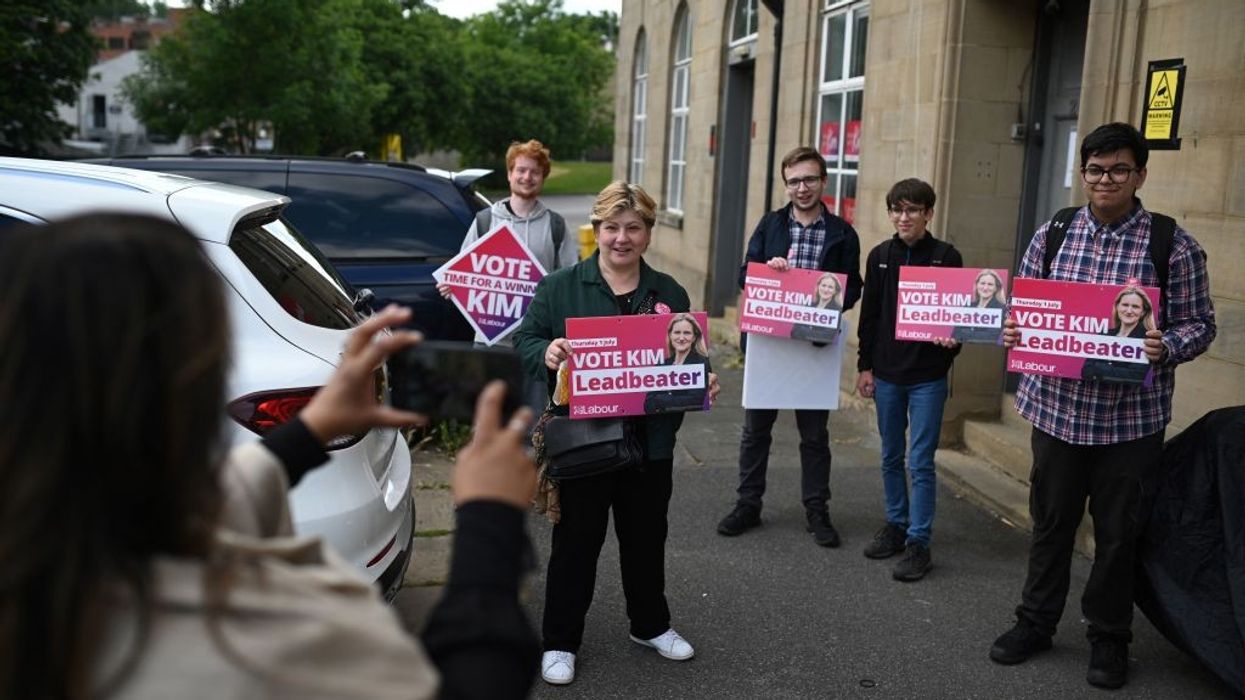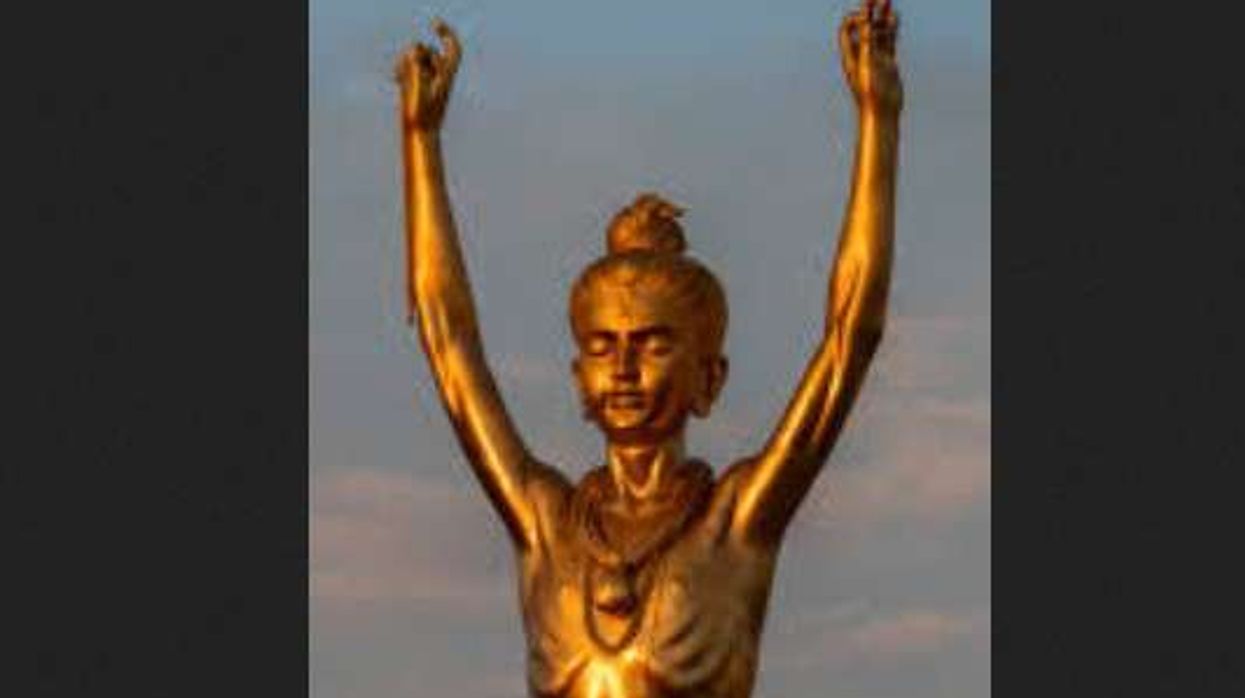The Labour Party has dragged India’s prime minister Narendra Modi into Thursday’s (1) Batley and Spen by-election by issuing a leaflet which says prime minister Boris Johnson has failed to condemn the Indian leader for his policies in Kashmir.
The literature has been widely condemned by many of Labour’s Indian origin MPs, among them Navendu Mishra, who said: “We beat our opponents based on policies, not by dog-whistle racism.”
In a constituency of 80,000, the leaflet appeared to be aimed at attracting some 8,600 Muslim voters, mostly of Pakistani origin. Labour holds the West Yorkshire seat with a slim majority of 3,525 votes.
The leaflet features a photograph of Modi and Johnson shaking hands and includes the warning: “Don’t risk a Tory MP who is not on your side.” It adds: “The risk of voting for anyone but Labour is clear.”
Johnson, who is slammed for not being sufficiently critical of Modi, is described as: “A prime minister who is silent on human rights abuses in Kashmir.” He is also “Accused of white washing Islamophobia”; and voters are reminded he has “compared Muslim women to letterboxes” and said, “Islam is the problem.”
There is a reference to a Sky News report: “Tory Islamophobia inquiry: Anti-Muslim sentiment ‘remains a problem’ with Conservative Party, report finds.”
Although there are 16 candidates standing, the contest is seen as a two-horse race between the Labour candidate, Kim Leadbeater, a personal trainer and campaigner, and Ryan Stephenson, chairman of the West Yorkshire Conservatives and a Leeds city councillor.
Leadbeater, 44, is the sister of Jo Cox, the former Labour MP for Batley. Her killer, Thomas Mair, who held far-right views, is serving a life sentence for her murder on June 16, 2016.
The by-election was triggered when her replacement, Tracey Brabin, stood down after being elected the Labour mayor of West Yorkshire in May.
A complicating factor has been George Galloway’s attempt to peel away some of the Muslim voters by raising the Palestinian issue. The maverick politician, who has stood for numerous parties in recent years, is standing this time for the “Workers Party”. His intervention will not help the Labour cause.
A spokesman for Labour said the party would “always bring communities together” but made it clear the leaflet would not be withdrawn: “This leaflet makes it clear that a vote for anybody other than Kim (Leadbeater) would lead to a Tory MP who would support a Prime Minister who insults Muslim women and calls it a joke, refuses to deal with Islamophobia in his party and fails to speak out on human rights abuses in Kashmir.”
The leaflet reminded those with long memories, among them Virendra Sharma, the Labour MP for Ealing Southall, of the events in Smethwick in the West Midlands in the 1964 general election. Then newly elected Labour prime minister Harold Wilson dismissed the victorious Tory MP, Peter Griffiths, as a “parliamentary leper”, after the latter had endorsed the slogan, “If you want a n****r for a neighbour, vote Labour.”
Eastern Eye asked Labour leader Sir Keir Starmer’s office to defend the leaflet, but received no response.
Sharma, chairman of the All-Party Parliamentary Group on India, was more forthcoming. He told Eastern Eye: “This divisive leaflet is cheap divide and rule politics not worthy of the Labour Party. We cannot take the low road here and engage in dog-whistle politics, we have to do much better than this.
“Under Keir and Angela’s (Rayner, Labour’s deputy leader) leadership the party has worked hard to rebuild trust with Indian community. Leaflets such as this will undo all of this good work and engagement and I have asked for it to be withdrawn.
“The Labour Party has always been the party of working people and working communities; divisive messages like this break those communities – they don’t help them. I have always stood on a platform supporting all of my constituents, working for their interests, not just playing politics. The Labour Party will win by bringing people together and uniting the community, to do anything else will divide our community and play into Tory hands.”
He said some in the Labour party took the view that the Indian vote was now more or less lost to the Tories and therefore it should shore up its support among Pakistanis. But Sharma argued this analysis was faulty and pointed out there were plenty of constituencies where Indian voters had remained loyal to the sitting Labour MP.
It is true that many Indians turned away from Labour in 2019 because of then leader Jeremy Corbyn’s perceived pro-Pakistan stance over Kashmir. However, Starmer has angered many of Labour’s traditional Pakistani backers by trying to steer a more neutral line on Kashmir. The party’s bye-election leaflet looks like Labour is alienating Indians once again.
The Indian diaspora is probably 2.5 million in size, compared with one million Pakistanis. In Batley, the ethnic vote could be a significant factor. However, the downside is that the leaflet could inflict long-term damage to Labour’s relations, once very close, with Indian voters.
Conservative Friends of India asked Starmer to clarify his message to Indians: “Dear @Keir_Starmer please can you explain this leaflet and clarify whether a Labour PM/Politician would refuse to have any relationship with the world’s largest democracy?”
Tory Party chairman and MP Amanda Milling said: “This is nasty and divisive politics. Once again Labour are playing politics rather than focusing on the issues that matter as the country recovers from the pandemic.”
The leaflet provoked internal warfare as well.
Mishra, who became the MP for Stockport in 2019, tweeted: “It saddens me to post this, but racism is alive and well within Labour. A hierarchy of racism exists inside the party and some groups are seen as fair game for attacks based on religion/race/heritage.”
Mishra, who resigned from the shadow government in October, said he had faced racism within the party because of his Indian heritage and Hindu faith. “The party needs to do a lot better when it comes to relationships with all communities. With regards to leaflets like this, we don’t expect this from Labour.”
The backlash against the leaflet has gone further.
Darren Jones, member for Bristol North West and chairman of Labour Friends of India, expressed his deep unease: “It is unfortunate that the Labour Party used a picture of the Prime Minister of India, the world’s largest democracy and one of the UK’s closest friends, from the G7 in 2019, on its leaflet. We ask the Labour Party to withdraw the leaflet immediately and we will also be writing to the leadership about this.”
Barry Gardiner, Labour MP for Brent North, said, "I have written to the chair of the party objecting and asking that this leaflet be withdrawn.
"The vicious and divisive attacks on the Labour candidate in Batley and Spen have been a disgrace. That is why it is all the more important that Labour should keep the moral high ground and refuse to engage in sectarian politics that set one community against another and stoke division.
"I have always condemned attempts to import the politics of the sub-continent into our community. I condemn all sectarian divisive politics, whether this is from the Conservatives and their anti-Islamic attacks on Sadiq Khan or whether it is Labour in leaflets like this.
"I believe our politics deserves better and that electors deserve better."












